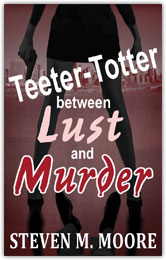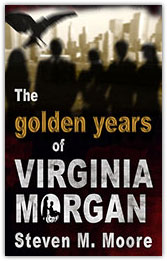Lack of resolution…
The twists and turns in a mystery story often delight readers of that genre. I like to include surprises at the beginning as well as the end too. The one at the beginning of Teeter-Totter between Lust and Murder is one of my favorite beginnings, while the shocker at the end is too, a denouement that Christie might have enjoyed if she were writing today. Because thrillers are close cousins to mysteries, the surprises abound in them too—the closet scene in Aristocrats and Assassins was a lot of fun to write.

But are you ever let down when the twist not only surprises but fails to resolve things? Or resolves them in a way that shows the crime wasn’t all that bad after all? The author has led you to believe something insidious is going on, but it’s not? I prefer just the opposite in both my reading and writing. If anything, I want the PI or detective to uncover something more insidious, not less. And I prefer it to be something that could be prejudicial for a lot of people—many potential victims who were saved by the principal character’s actions.
Serial killers just aren’t that interesting to me as characters in my writing for that reason. No major novel of mine contains that kind of character. The key word is “serial.” That means the crimes occur in linear fashion. Sure, the perp can speed things up as he becomes more arrogant and taunts the police. Those plots make me say, “Hmm, they’re going to have to stop him before he strikes again.” Too predictable. By the way, the serial killer is usually male, so casting a female in that role could represent an interesting novelty. It might be fun to guess who the killer is too—some surprises can be created in that way—but in general plots with serial killers are overdone. Yet, if the author ends the book with the capture and conviction of the supposed killer but includes another killing with the same MO, setting the stage for another boo, this creates a total lack of resolution and deceives the reader, a type of cliffhanger that leaves me frustrated.

I can summarize my points in the following way: I have a lot of fun when an author moves from small crimes to bigger ones and the big ones are solved almost by accident. That shows the main characters, the PIs or detectives, are human and didn’t realize what they were up against. Real life is like that.
I can even summarize more succinctly and even amplify: I love complexity. When something small unexpectedly becomes big, that’s complexity. When things become nonlinear or oscillatory—the plot goes back and forth and up and down—that’s complexity. Often a local crime has national and international ramifications, and a team of characters have to rise to the occasion and halt what’s going on. And it all has to be resolved in the end, or I feel swindled.
I admit this might be rare in current mystery or crime novels, more than the simple sequence of A = a crime occurs and B = the perpetrators are caught must be present to catch my interest…and B can’t be a swindle. That simple sequence might be appropriate for a short story, but novels need more meat to them for me to be all in.
These are observations I’ve made over a lifetime of reading mystery and crime stories. They’re my preferences, not rules written in stone. And what some readers take as too complex is what others take as too simple. That’s what’s wonderful about reading: every reader can react differently to a story.
***

Comments are always welcome!
The Golden Years of Virginia Morgan. Plenty of resolution in this bridge book between my “Detectives Chen and Castilblanco Series” and the “Clones and Mutants Trilogy” that’s full of important themes—retirement (what will U.S. government agencies do in the future with agents who know too much?), autumnal romance (can people over fifty find love?), and shadowy conspiracies (are they the government’s or some other actors’?). The action and suspense start on page one and don’t stop. Available in ebook format on Amazon and Smashwords and all the latter’s affiliated retailers (iBooks, B&N, Kobo, etc.) and lending and library services (Scribd, Overdrive, Baker & Taylor, Gardners, etc.).
Around the world and to the stars! In libris libertas!
